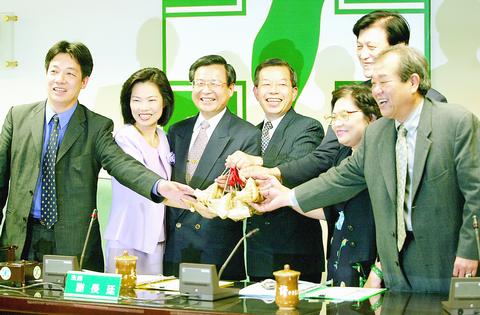To prepare for the possibility of a "two-party" system after the year-end elections, the DPP yesterday held the first of a series of debates on whether an alliance would be beneficial to the party.
There has been talk recently in political circles of an alliance forming between former president Lee Teng-hui (李登輝) and President Chen Shui-bian (陳水扁), creating the so-called Lee-Bian alliance.

PHOTO: CHEN CHENG-CHANG, TAIPEI TIMES
In addition, KMT Chairman Lien Chan (
DPP members met yesterday to debate potential outcomes of an alliance with Lee and the possibility that Taiwan politics may be headed for a political arrangement that resembles a two-party system.
Members of the pro-alliance debate team included party Secretary-General Wu Nai-jen (吳乃仁), central standing committee member Liu Shih-fang (劉世芳) and legislator Cho Jung-tai (卓榮泰).
Debating the negative side were legislator Shen Fu-hsiung (
In yesterday's discussion, which was held behind closed doors, Kuo said that he believed there would be three disadvantages to the DPP should politics split into Lee-Bian and Lien-Soong camps.
First, pro-Lee candidates could siphon away DPP votes, hurting the party's candidates.
Second, Kuo said, a Lee-Bian alliance would limit the party's ability to align with other opposition parties, as everyone else would have chosen sides after the elections.
Third, a Lee-Bian alliance could intensify ethnic and ideological confrontation in Taiwan -- such as the issues of Taiwan independence and unification with China -- to the party's disadvantage.
In support of Kuo's view, Shen said the party should not take the risk of asking voters to take sides because they might not choose the DPP, adding they risked losing their middle-of-the-road supporters.
But Cho, speaking on the pro side, said "the DPP would likely win an absolute majority to maintain political stability if two major political alliances, not necessarily two parties, have been forged."
He said that the party, before the year-end elections, should clearly declare whom it wants to become a partner with or cooperate with.
Cho also urged the DPP not to overemphasize the pro-Taiwan angle.
Instead, he said the party's record on "black gold" politics should be stressed in order to differentiate the DPP from Lien and Soong.
The DPP plans to hold five more discussions to debate topics. These are to cover partisan confrontation, the DPP government's achievements and faults, the timetable for implementation of the three major links and also the current economic downturn.
Conclusions drawn from the debates will be prepared as reference materials for DPP officials who are invited to attend call-in shows and defend the party's policies.

AGING: As of last month, people aged 65 or older accounted for 20.06 percent of the total population and the number of couples who got married fell by 18,685 from 2024 Taiwan has surpassed South Korea as the country least willing to have children, with an annual crude birthrate of 4.62 per 1,000 people, Ministry of the Interior data showed yesterday. The nation was previously ranked the second-lowest country in terms of total fertility rate, or the average number of children a woman has in her lifetime. However, South Korea’s fertility rate began to recover from 2023, with total fertility rate rising from 0.72 and estimated to reach 0.82 to 0.85 by last year, and the crude birthrate projected at 6.7 per 1,000 people. Japan’s crude birthrate was projected to fall below six,

Conflict with Taiwan could leave China with “massive economic disruption, catastrophic military losses, significant social unrest, and devastating sanctions,” a US think tank said in a report released on Monday. The German Marshall Fund released a report titled If China Attacks Taiwan: The Consequences for China of “Minor Conflict” and “Major War” Scenarios. The report details the “massive” economic, military, social and international costs to China in the event of a minor conflict or major war with Taiwan, estimating that the Chinese People’s Liberation Army (PLA) could sustain losses of more than half of its active-duty ground forces, including 100,000 troops. Understanding Chinese

US President Donald Trump in an interview with the New York Times published on Thursday said that “it’s up to” Chinese President Xi Jinping (習近平) what China does on Taiwan, but that he would be “very unhappy” with a change in the “status quo.” “He [Xi] considers it to be a part of China, and that’s up to him what he’s going to be doing, but I’ve expressed to him that I would be very unhappy if he did that, and I don’t think he’ll do that. I hope he doesn’t do that,” Trump said. Trump made the comments in the context

SELF-DEFENSE: Tokyo has accelerated its spending goal and its defense minister said the nation needs to discuss whether it should develop nuclear-powered submarines China is ramping up objections to what it sees as Japan’s desire to acquire nuclear weapons, despite Tokyo’s longstanding renunciation of such arms, deepening another fissure in the two neighbors’ increasingly tense ties. In what appears to be a concerted effort, China’s foreign and defense ministries issued statements on Thursday condemning alleged remilitarism efforts by Tokyo. The remarks came as two of the country’s top think tanks jointly issued a 29-page report framing actions by “right-wing forces” in Japan as posing a “serious threat” to world peace. While that report did not define “right-wing forces,” the Chinese Ministry of Foreign Affairs was